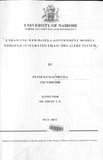| dc.description.abstract | The development of ICT has enormously influenced the social, economic and political life pattern in
both developed and developing countries. Governance, democracy and commerce have changed due
to the development ofICT (Tony, Goodwin and Paul, 2008). This has led to the development of new
terms like e-Government, e-Democracy and e-Commerce among others. This study focused on the
existing e-Government models, their functionalities, effectiveness, efficiency and reliability.
E-government models adopted by most countries are Web-based or SMS-based. This study was a
case study of the use of the web-based e-Government model in the University of Nairobi which is a
Government agency. The study focused on the email and SMS as the main communication tools
used by government agencies for communication. The study investigated the use of the email tool to
ascertain its effectiveness. The study sought to improve the email effectiveness and reduce response
time through alert messages send to the mobile phones of the email account owners. This will
integrate the Web-based (email) and the SMS-based e-government models to reap on the benefits of
both models.
Questionnaire was used as the main data collection instrument. The data collected was analyzed
using Statistical Package for Social Science (SPSS) to determine extend of the use, effectiveness,
efficiency and reliability of Email and SMS based Information Systems. Stratified random sampling
was used to determine the population from where the research data was collected.
The collected data was prepared for analysis using SPSS. Inferences were drawn from the research
findings to justify the need of improving the Web-based e-Government Model. The findings
indicated that web-based (websites, blogs and Email) models are the widely used e-government
models in developed and developing countries. It was also found out that SMS-based models are
increasingly becoming popular in developed and developing countries. It was further found that
integrating both models is possible to enable citizens, businesses and other entities that interact with
the government to reap on the benefits of both models. Based on these findings, a prototype of the
proposed e-government model was designed, developed, tested and an implementation framework
developed. The entire study took a maximum duration of six (6) months. | en |

